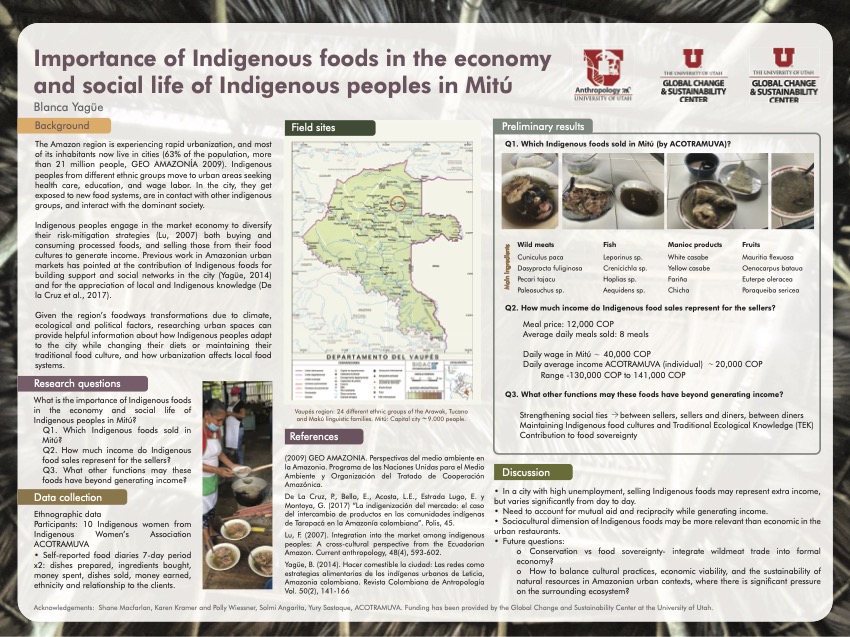Importance of Indigenous foods in the economy and social life of Indigenous peoples in Mitú
–Blanca Yagüe
[bs_collapse id=”collapse_bb86-afd7″]
[bs_citem title=”Bio” id=”citem_e610-6c22″ parent=”collapse_bb86-afd7″]
I am a Social Justice Scholar with an interdisciplinary background, currently in the Ph.D. program in Anthropology working with Dr. Shane Macfarlan. My research in Colombia investigates diet transition in urban Amazonia, and “food as cultural resistance.” I work with Indigenous peoples in urban spaces and collaborate with Indigenous organizations. I also conduct research in Utah as one of the Food Research Projects Leads of the SPARC – Environmental Justice Lab.
[/bs_citem]
[bs_citem title=”Abstract” id=”citem_eca8-96a7″ parent=”collapse_bb86-afd7″]
This project aims to understand the significance of Indigenous foods in the economy and social life of Indigenous peoples in Mitú, a small city in the Colombian Amazon. While the Amazon region is becoming urbanized, Indigenous peoples integrate into the market and experience a food transition. However, Indigenous food cultures are still vibrant, even in the city. This study employs different ethnographic methods at the informal street market and the restaurants of the Indigenous women association ACOTRAMUVA, to assess the importance of such economic activity linked to Indigenous knowledge and identity, and to reveal how it contributes to strengthening social ties in the urban environment.
[/bs_citem]
[bs_citem title=”Narrative” id=”citem_780c-0f71″ parent=”collapse_bb86-afd7″]
Indigenous foods are very present in the city of Mitú, sold by Indigenous urban dwellers and those living in nearby communities. Preliminary results show that although selling Indigenous foods at the restaurants in Mitú may not be of great economic significance, it is still generating income. However, the importance of these Indigenous foods in the city of Mitú may lay on the sociocultural dimension, as its consumption is linked to ethnic identity, the maintenance of cultural traditions, and the strengthening of social relationships. Additionally, some questions arise on how to balance cultural practices, economic viability, and the sustainability of natural resources in Amazonian urban contexts, as some foods, like wildmeat, may be subject to relatively high extraction rates and potentially affect local ecosystems.
[/bs_citem]
[/bs_collapse]
